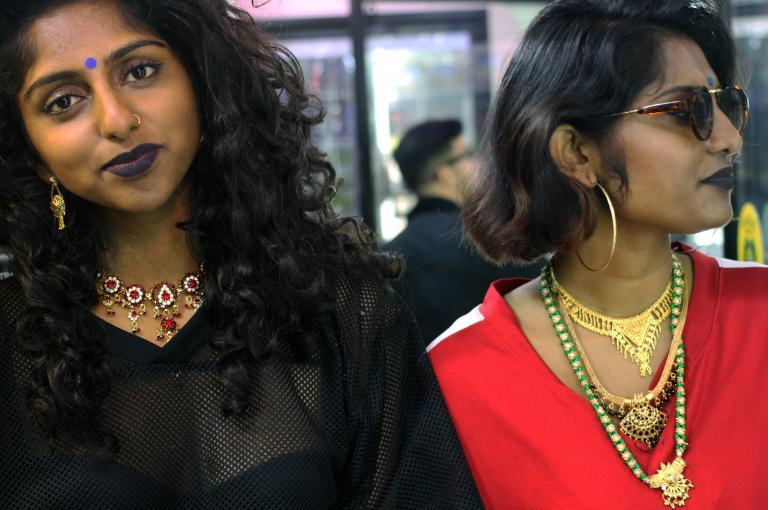Mirusha and Yanusha Yogarajah posing for the Unfair & Lovely series.
India is a country obsessed with fair skin.
From a young age, girls are told to stay out of the sun, taught how to use face masks with lightening properties and instructed to avoid drinking tea because “it makes your skin darker.” The notion of beauty is heavily weighted in favor of lighter skin, and “fairness creams” like the popular Fair & Lovely are a multimillion-dollar business. And it's not just women who whiten: Fairness creams for men — rebranded Fair & Handsome — are raking in the cash, too.
Commercials for fairness creams are similar to the ones for washing powder: Take something dark, use product, make it whiter and brighter. The model’s lighter skin color results in beaming smiles, job offers and happy endings all around.
oembed://https%3A//www.youtube.com/watch%3Fv%3De4OudWoqgRo
Some young women, though, are standing up to this colorism. A campaign called Dark is Beautiful, fronted by actor Nandita Das, helped push the Advertising Standards Council of India to ban discriminatory commercials for fairness products in 2014.
More recently, Unfair & Lovely, started by students at the University of Texas, has caught the imagination of dark-skinned women around the world.
More from GlobalPost: Indian men seek whiter shade of pale
It started with pictures that one of the friends, Pax Jones, a black woman, took of Mirusha Yogarajah and her sister, Yanusha, two women of South Asian descent. “We decided to name the series Unfair and Lovely in order to address the hyphenated identities of people of color in the West, and colorism in the black and brown communities,” Mirusha says.
The photo shoot featured the Yogarajah sisters, confident in their contemporary clothing, juxtaposed with traditional South Asian jewelry.
![]()
![]()
“Pax asked us [to take part] after noticing that even many of the advocates/activists addressing racism in the black community who had a large following had light skin,” Yogarajah said. “We discussed it, and I noticed the same thing in the South Asian community — activists and advocates with a large audience against racism, sexism, fatphobia, etc., usually were lighter skinned. So this photo shoot occurred, and then we created a hashtag.”
Their campaign led to #Unfairandlovely trending on Twitter. Many brown women — not just Indians — have shared their own photos in response.
Colorism is a global phenomenon, and social media is proving to be an effective outlet to vent about it. While the Unfair & Lovely campaign has gathered interest primarily among young Asian American women on Twitter and Instagram, the Dark is Beautiful Facebook page is reaching a large audience in India and the subcontinent, with more than 46,000 likes.
Unfair & Lovely speaks for many. “It's for ANY person of color who is darker skinned — Black, South Asian, Latinx, etc.,” says Yogarajah, whose parents are from Sri Lanka.
More specific is another campaign that she is involved in: Reclaim the Bindi Week, which runs from March 8 through March 14 to highlight the appropriation of traditional South Asian symbols.
The aim is “to address both cultural appropriation for those in communities that traditionally adorn the bindi and to have another platform for darker-skinned folk to empower one another,” according to Yogarajah. Organizers are calling on people to post selfies, stories and artwork “until social media is flooded with South Asian pride.”
The start of the campaign coincides with International Women’s Day.
India celebrates the event in a big way, though some say it’s mostly tokenism. Alongside the marches, speeches and rallies, International Women’s Day in India is just another excuse for discounts on fashion and beauty products — including the ubiquitous skin-whitening creams.
Editor's note: This story was updated to give a fuller account of the campaign's origins.
Our coverage reaches millions each week, but only a small fraction of listeners contribute to sustain our program. We still need 224 more people to donate $100 or $10/monthly to unlock our $67,000 match. Will you help us get there today?
